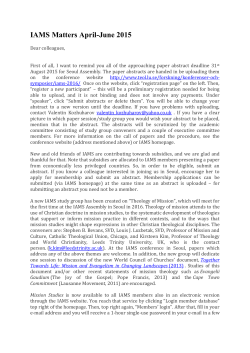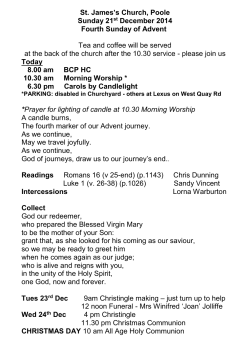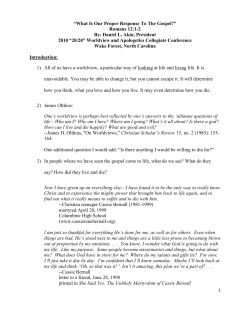
Religion and Development - Initiative Südliches Afrika (INISA) eV
Religion and Development: Does Christianity Enable or Hinder Development in Africa? Panel Discussion based on a book presentation May 18th, 2015, 17-19:00 German Development Institute / Deutsches Institut für Entwicklungspolitik in cooperation with INISA (Initiative Südliches Afrika) Tulpenfeld 6, 53115 Bonn, Hörsaal The relevance of religion for development has been widely acknowledged in global politics. International organizations such as the World Bank or bilateral players such as Germany or Switzerland emphasize the constructive role of religious organizations for development. Accordingly, Western donors, the United Nations, and civil society organizations fund and support faith-based non-governmental organizations. It seems to be common sense that Christian values are likely to be conducive to development of societies. However, little is known about the nature of faith-based organizations (FBOs) and how individual beliefs and FBOs impact development. Paul Gifford will present the findings of his book "Christianity, Development and Modernity in Africa”. He argues that ‘African Christianity’ comes in very different forms, with very different consequences for development. He observes an unremarked diversity within African Christianity; on the one hand, an enchanted Christianity that views the world as pervaded by spiritual forces, and on the other a disenchanted Christianity that discounts such forces. His findings will be discussed by experts on religion and development in a subsequent panel discussion, which is based on the following guiding questions: How does Christian belief influence development in Africa? Do faith based organizations impact development in Africa? Should development cooperation engage more with religious actors? Program Christianity, Development and Modernization in Africa (presentation of book) Prof. Paul Gifford, Emeritus Professor of School of Oriental and African Studies (SOAS), University of London Discussants Dr. Ismaïl Lagardien Former Member of the Secretariat of the National Planning Commission in the The Presidency of South Africa & Guest Scholar at DIE Martin Mauthe-Käter Deputy Head of Policy Division, Political Staff, Federal Ministry for Economic Cooperation and Development Moderator: Dr. Julia Leininger, German Development Institute / Deutsches Institut für Entwicklungspolitik (DIE) Discussion with the Audience End of the Discussion and Get-Together Kindly register by 13th May at Gisela.kuhlmann@die-gdi.de
© Copyright 2025















